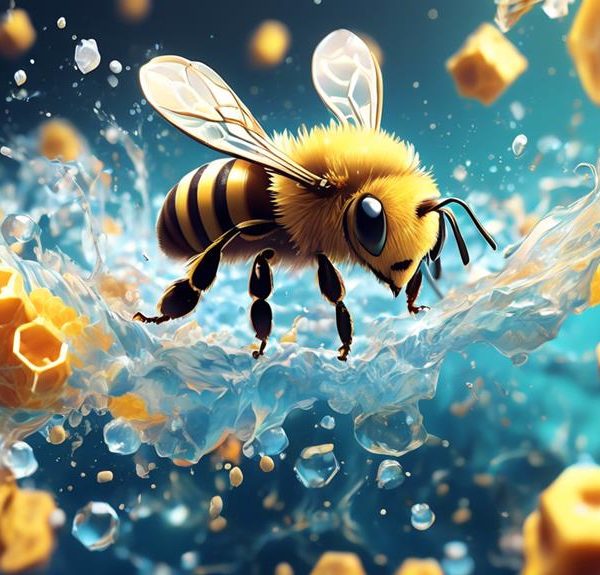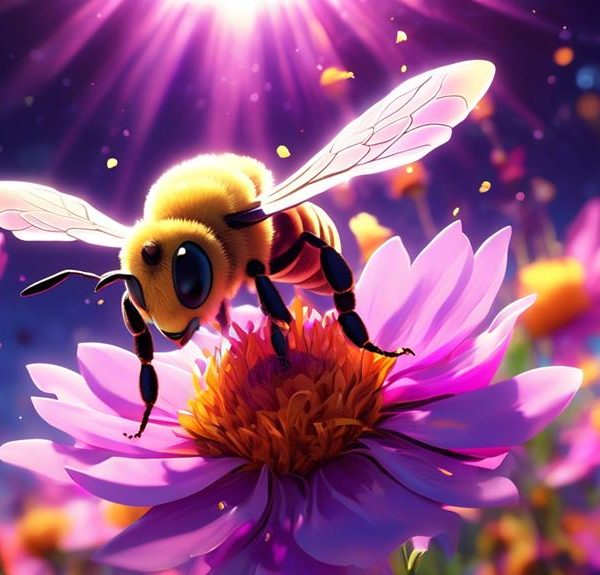Wondering how to keep bees in the city? Discover why urban hives are thriving and how your city balcony could become your own beekeeping haven.
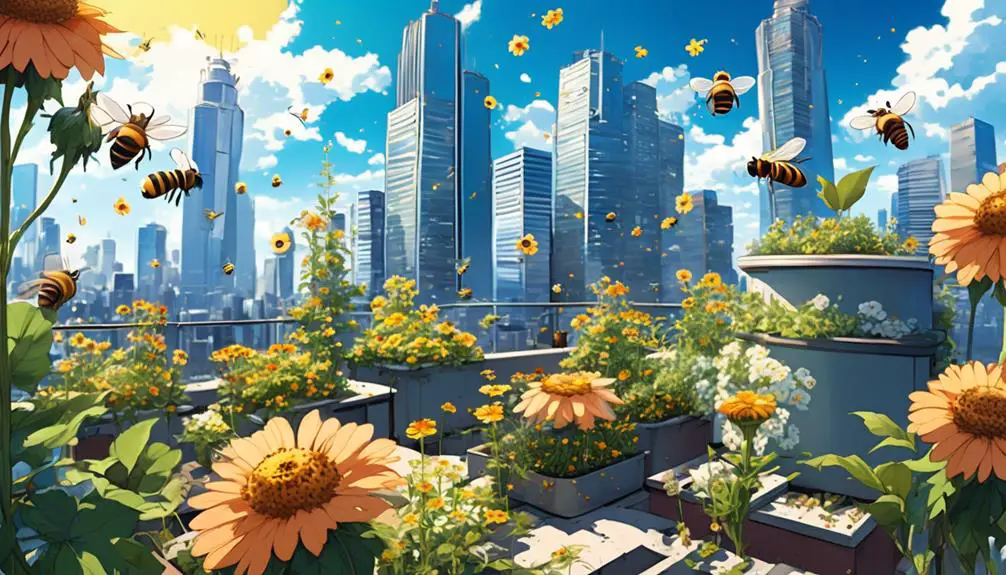
Can You Have Bees in the City?
You might not be aware, but beekeeping isn't just a countryside pursuit; it's becoming increasingly popular in cities worldwide.
Urban beekeeping, or apiculture, is a trend that's buzzing in cities from New York to Tokyo. Now, you're probably wondering, 'Can I really keep bees in the city?' Well, not only is it possible, but city bees also tend to be healthier and more productive than their rural counterparts.
But why is this the case, and what does it take to maintain an urban hive? Let's explore further and discover why your city balcony may be the perfect spot for a new hive.
Key Takeaways
- Urban beekeeping is a growing trend worldwide, helping to mitigate the declining bee population and promoting biodiversity.
- City bees are vital pollinators that contribute to the flourishing of urban gardens and produce high-quality honey.
- Regulations for urban beekeeping vary by city, and it is essential to check local zoning laws to ensure compliance.
- Challenges in urban beekeeping include limited space, lack of diverse flora, educating neighbors, and dealing with city regulations, requiring perseverance and dedication.
The Rise of Urban Beekeeping

You mightn't expect it, but the buzz of urban beekeeping has been steadily growing, transforming city rooftops and balconies into buzzing mini ecosystems. What was once a rare sight in metropolitan areas is now becoming commonplace, and you're a part of this revolution.
Urban beekeeping is more than just a trendy hobby; it's a vital ecological movement. As you know, bees are key pollinators and their diminishing numbers in recent years have been a cause for concern. By keeping bees in the city, you're helping to mitigate this, providing these busy little workers with a safe haven.
Your role might seem small, but you're contributing to a much larger cause. The honey you harvest is a sweet reminder of your contribution to the planet's wellbeing. It goes beyond personal satisfaction; it's about community and sustainability. You're actively promoting biodiversity, supporting local ecosystems and creating a healthier, greener city for everyone.
Urban beekeeping isn't just about the bees, it's about you and your role in the world. So go ahead, don your beekeeper suit, and join the urban beekeeping revolution.
You're not just a beekeeper; you're an urban eco-warrior.
Benefits of City Bees

Diving into the world of city bees reveals a plethora of benefits that are not only sweet to the bees but also to the environment and city dwellers alike. You might be surprised to find out that these tiny creatures play a significant role in sustaining city ecosystems and enhancing our urban lives.
Benefit | Explanation | Emotional Impact |
|---|---|---|
Pollination | Bees are vital pollinators, they help urban gardens flourish, contributing to city biodiversity. | You'll feel a deeper connection to nature and your local environment. |
Honey Production | City bees produce high-quality honey that's often healthier than commercially produced varieties. | You'll love the taste of fresh, local honey and feel good knowing it's healthy and sustainable. |
Education | Beekeeping is a fascinating hobby that can teach you a lot about nature and ecology. | You'll feel a sense of accomplishment and wonder as you learn about these amazing creatures. |
Community Building | Urban beekeeping can bring neighbors together, fostering a sense of community. | You'll enjoy the camaraderie and shared purpose that comes with caring for bees. |
Legalities Around Urban Beekeeping

While it's exciting to recognize the myriad benefits urban bees bring, it's essential to understand the legalities surrounding urban beekeeping to ensure this rewarding pursuit is conducted responsibly and ethically.
You see, regulations vary widely, from city to city, and even neighborhood to neighborhood. Ignorance isn't an excuse in the eyes of the law, and penalties can range from fines to the removal of your hives.
You should start by checking local zoning laws. Some municipalities require specific permits or impose distance rules, meaning hives must be a certain distance from property lines or public spaces. It's also worth checking if there are any restrictions on the number of hives you can keep.
But don't be disheartened; many cities are actively encouraging urban beekeeping. They understand the critical role bees play in pollination, and how they contribute to urban biodiversity. In these places, you'll find supportive beekeeping communities and resources to help you navigate the legal landscape.
Challenges in Urban Beekeeping
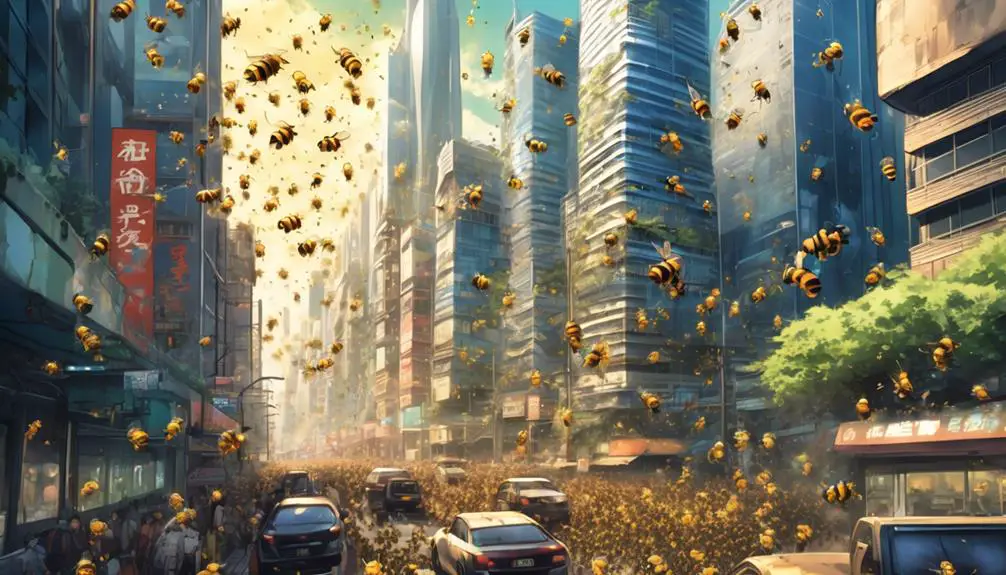
Despite the increasing acceptance and legality of urban beekeeping, the path isn't always smooth. City-dwelling apiarists often face unique challenges that can test their skills and patience.
The first issue you'll encounter is the limited space in urban settings. It's not as simple as setting up a hive in your backyard, because the bees need a certain amount of space to fly and forage.
A lack of diverse flora in cities can also pose problems. Your bees need a variety of plants for a balanced diet. If they don't get enough diversity, they could face health issues. Additionally, many city plants are treated with pesticides, which can be harmful to your bees.
You'll also need to deal with the perception of bees as dangerous pests. Educating your neighbors about the importance and safety of beekeeping can be a time-consuming task, but it's crucial to ensure peaceful coexistence.
Lastly, city regulations can be a maze to navigate. You must ensure you're complying with all local laws and ordinances to avoid hefty penalties.
Urban beekeeping is a rewarding endeavor, but these challenges make it clear that it's not for the faint-hearted.
Starting Your Urban Beehive
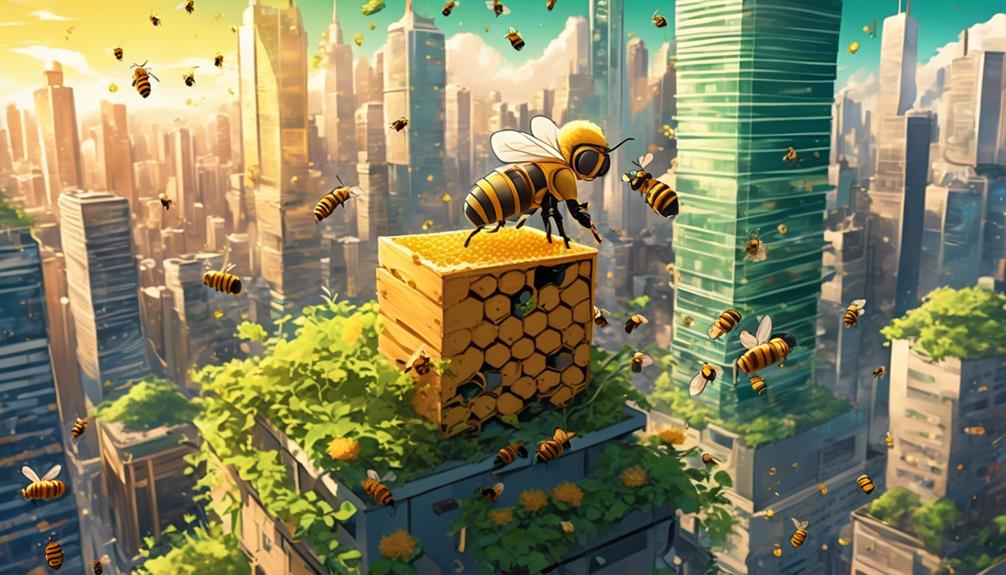
Having braved the challenges of urban beekeeping, you're now ready to embark on the exciting journey of setting up your own city hive.
The first step is to assemble your hive. You can purchase a ready-made hive or build your own. It's vital to ensure it's sturdy, waterproof, and well-ventilated.
Next, you'll need to source your bees. You can purchase a package of bees or capture a swarm. If you're a novice, buying a package is recommended. They come with a queen and a few thousand worker bees, giving your hive a strong start.
Location is key. Your hive should be placed in a spot with morning sun, afternoon shade, and protection from strong winds. A rooftop, balcony, or backyard can work perfectly. It's essential to consider your neighbors and local laws, ensuring you're respectful and compliant.
Maintenance and Safety Tips
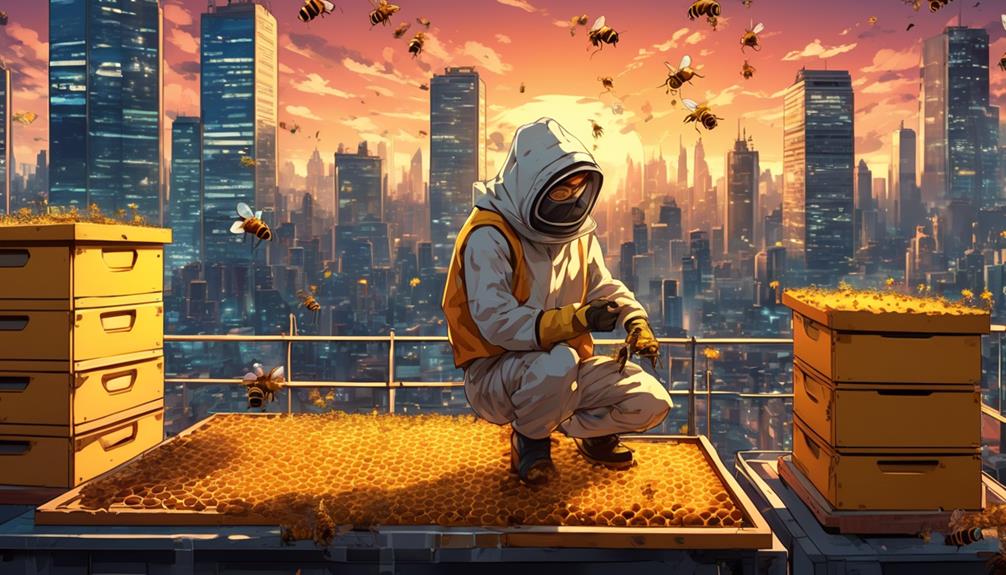
Once you've got your urban beehive up and running, it's crucial to understand the importance of regular maintenance and safety precautions to ensure the health of your bees and the productivity of your hive.
Firstly, keep your hive clean. A dirty hive can lead to disease and infestations. Regularly check your hive for signs of pests and disease, such as mold, parasites, or unusual bee behavior. Always wear protective gear when handling your hive; bee stings can lead to severe allergic reactions, so don't take any risks.
Secondly, provide a constant water source for your bees. They use water for cooling the hive, hydration, and food preparation. Without water, your bees may venture elsewhere, potentially causing problems with neighbors.
Lastly, consider the hive's location. It should be easily accessible for maintenance but not in a high-traffic area where people or pets could disturb it. The hive entrance should face away from living areas and preferably towards a barrier, like a fence, to encourage bees to fly upwards.
Frequently Asked Questions
What Types of Bees Are Best Suited for Urban Environments?
You're on the right track, thinking about urban beekeeping. When considering types of bees best suited for city lifestyles, Italian honey bees really stand out. They're gentle, great for beginners, and prolific honey producers.
Mason bees are another good choice. They're solitary, non-aggressive and great pollinators.
Can Bees Coexist With Other City-Dwelling Animals and Pets?
Absolutely, bees can coexist harmoniously with other city-dwelling animals and pets. It's all about ensuring balance. Bees typically don't bother anyone unless they're provoked.
If you're thinking of urban beekeeping, you'll need to take precautions to prevent any potential conflicts, like keeping hives elevated and away from high-traffic areas.
With a bit of knowledge and care, you can successfully integrate bees into an urban environment.
What Impact Can Urban Beekeeping Have on Local City Flora?
Sure, urban beekeeping can significantly enhance local city flora. Bees are vital pollinators, you see, and by transferring pollen from one flower to another, they're boosting plant reproduction. This results in a greater variety of plants and more robust growth.
Can Urban Beekeeping Potentially Contribute to Gentrification Issues?
You're right to consider the socio-economic implications of urban beekeeping.
Yes, it can contribute to gentrification issues.
When beekeeping becomes trendy in a neighborhood, it often draws wealthier residents and businesses, increasing property values.
This may force out lower-income locals.
So, while you're helping the bees and environment, make sure you're aware of the potential impact on your community.
It's about striking a balance between ecological benefits and social harmony.
What Are Some Unique Ways to Incorporate Honey From Urban Bees Into Local Cuisine?
You can get creative with honey from urban bees in your local cuisine. Consider drizzling it over fresh cheese or incorporating it into glazes for roasted meats.
It's great in vinaigrettes, adding a sweet, complex note to salads. You could also use it to sweeten your morning tea or coffee.
Don't forget about desserts, it's perfect in cakes, cookies, or as a syrup for pancakes and waffles.
The possibilities are endless!
Conclusion
So, you can indeed keep bees in the city! Their benefits are plentiful, from supporting local biodiversity to producing delicious honey.
Stay informed about the legalities, and brace for challenges. Starting your urban beehive is a rewarding journey, but remember, maintenance and safety are key.
Embrace urban beekeeping, and do your part in maintaining the health of our planet's ecosystems. It's a sweet deal, wouldn't you agree?

